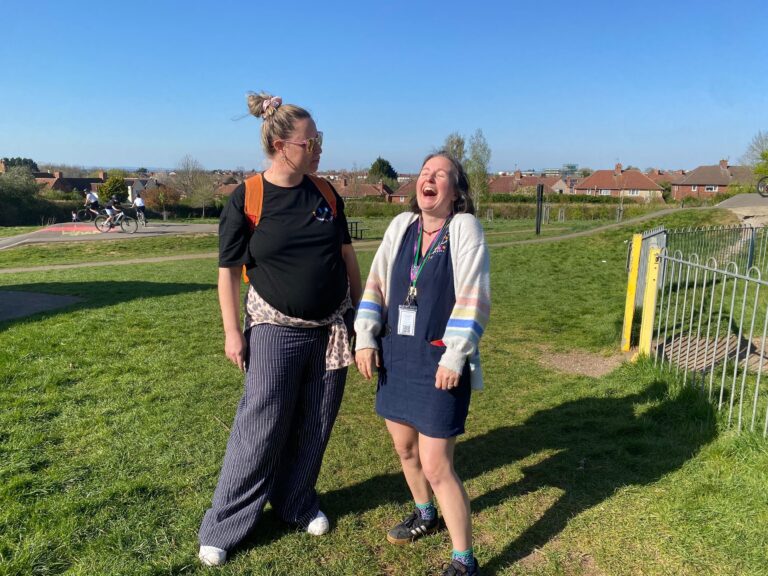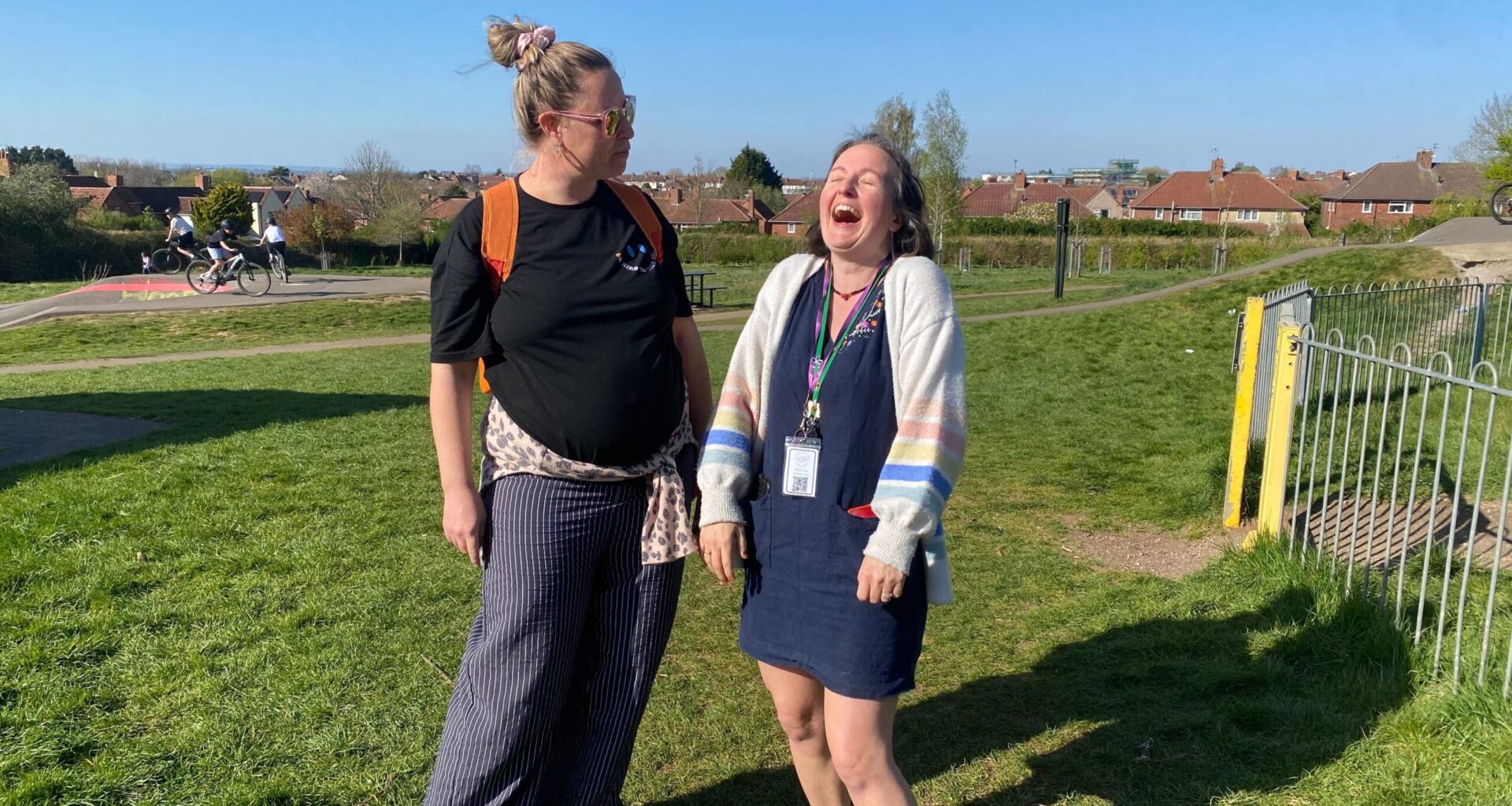
It’s a bright spring afternoon in Hillfields. The neighbourhood green buzzes with life — kids tear around the skatepark, parents chat by the swings. In one corner, raised beds bloom in the community garden. In another, the old community centre stands quiet — for now.
Showing us around is Sarah Rogers — part tour guide, part whirlwind. She’s the CEO and co-founder of Hillfields Community Garden and barely takes a few steps without someone stopping her. Sarah is the driving force behind efforts to revive the centre, after the charity that ran it folded last year following two decades of service.
Inside, the building is cluttered with boxes and stacked furniture. The vision for the space is bold: a community café, debt and housing advice, wellbeing and adult education services, and welcoming rooms where people can get help — or just have a cuppa.
Sarah had hoped to open last September. But big hurdles remain. The team is operating under a temporary licence, with no lease and no secured funding for urgent repairs. “The boiler quote came back at £34,000 — and that’s for gas! I’m an environmentalist. I want solar!” she says, exasperated.
But the demand for the centre is clear. “I haven’t spent a penny on advertising, but the list of people and organisations who want to use the space is now five pages long.”
People keep asking when they’ll open. Her answer? “As soon as we can!”
Sarah hopes to open later this summer, but nothing is guaranteed. “Everything is at a glacial pace,” she says. “We just have to keep our nerve.”
Community centres in the age of austerity
Before it stood empty, the building was known as the Hillfields Hub — home to the Hillfields Family and Community Trust, a charity rooted in the area for more than 20 years. It was started by two local mums who formed the Hillfields Young Mothers Group. Through the pandemic, they kept going: running food support, offering a steady presence, and holding space for the community.
Sarah’s own journey began in the garden across the square. She co-founded it with another local mum, Becca Mills, starting with raised beds and weekend events. What began as a hobby evolved into a job when growing community demand led to the organisation’s registration as a charity.
When the centre’s former operators gave notice in early 2024, Sarah didn’t hesitate.
“I threw myself into it,” she says. “I wrote a 45-page business plan, applied for the funding to redo the kitchen, wrote 25 policies, and went out to network with every sector I could get a foot in the door — from sport to NHS, to young people, to older people…” she lists.
We didn’t build it for people. They designed and built it. It’s theirs
Sarah Rogers
Her team got the keys in February this year. Since then, she’s written several funding bids, drafted a new business plan, and laid the groundwork for relaunch.
For a long time, she did it solo. “I do HR, fundraising, payroll. I’m the CEO and the cleaner,” she laughs. “You have to be a 360-degree Swiss Army knife.”
Now she leads a small team: a community connector, a centre coordinator, an outdoor learning lead, and, more recently, a community chef. But the graft is still tough.
But Sarah is quick to credit her team and the wider support network — including a tight-knit group of volunteers, a dedicated board and local councillors like Kelvin Blake and Ellie King, and Kerry Rowe, a Community Development practitioner.
We speak to one of the volunteers, Vanessa, a nutritionist and analyst with deep knowledge of food access. “This community,” she says, “has a wealth of knowledge, heaps of enthusiasm, and real commitment. There’s a public health benefit to making sure people eat well.”
Funding remains piecemeal — from the National Lottery, Bristol City Council, the Quartet Community Foundation, the NHS, and others. It’s a snapshot of how community centres survive in austerity Britain: short-term grants, no guarantees.
Built together, not for
The community garden was shaped by local people, and Sarah is determined that the centre will be too. “We didn’t build it for people. They designed and built it. It’s theirs.”
That ethos runs through everything. “I could make you a cup of tea, or I could say, ‘Do you want to come make it with me?’ It might end up being chai, not tea. But we’re doing it together, and that’s what’s important”
The over-60s club, Silver Explorers, follows that model. “I had the idea, but they shaped it. One week it’s chair yoga, the next a history talk — depending on what they want,” Sarah says.
Anyone running services in the building will be asked to take the same approach. “No more parachute in, parachute out. If you want to work here, you can sign a partnership agreement. It has to uplift local people.”
Despite the weight she carries, Sarah is clear: “I love doing it. The more I did, the better I was. But it’s a bright candle I burn for myself,” she says. “You’ve got to make sure you don’t burn through your fuel too fast.”
Hillfields is changing, as people move in, drawn by more affordable house prices and green spaces. But the centre is back in community hands — and for Sarah and the team, that’s what matters most.
“If we can hold onto a sense of community ownership and place, we’ve got a fighting chance of building something that lasts. But we still have a broken boiler!”
To support or get involved with the project, contact Sarah at:
info@hillfieldscommunitygarden.co.uk or donate to the crowdfunder.
Independent. Investigative. Indispensable.
Investigative journalism strengthens democracy – it’s a necessity, not a luxury.
The Cable is Bristol’s independent, investigative newsroom. Owned and steered by more than 2,500 members, we produce award-winning journalism that digs deep into what’s happening in Bristol.
We are on a mission to become sustainable, and to do that we need more members. Will you help us get there?

